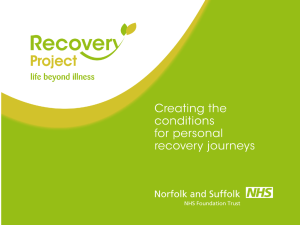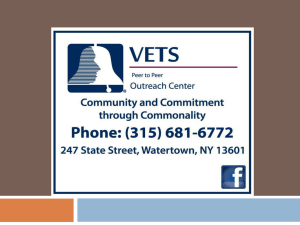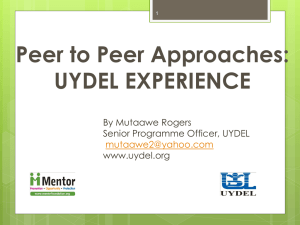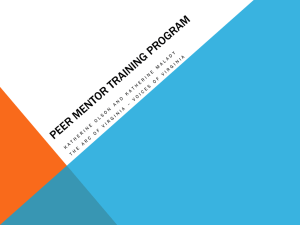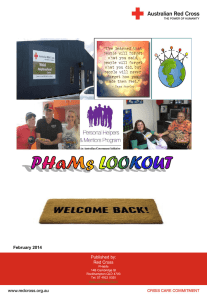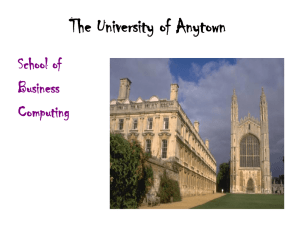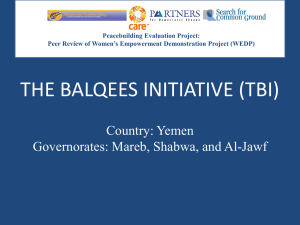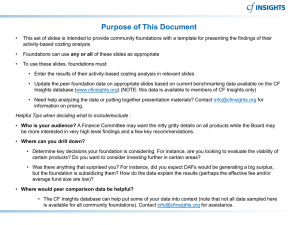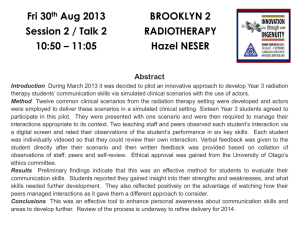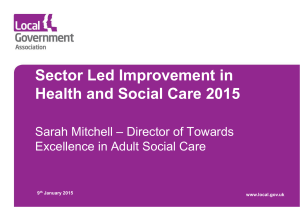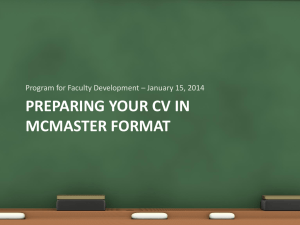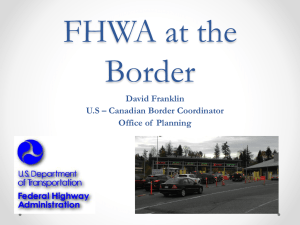peer support forum - PWA: The Peer Workforce Association
advertisement
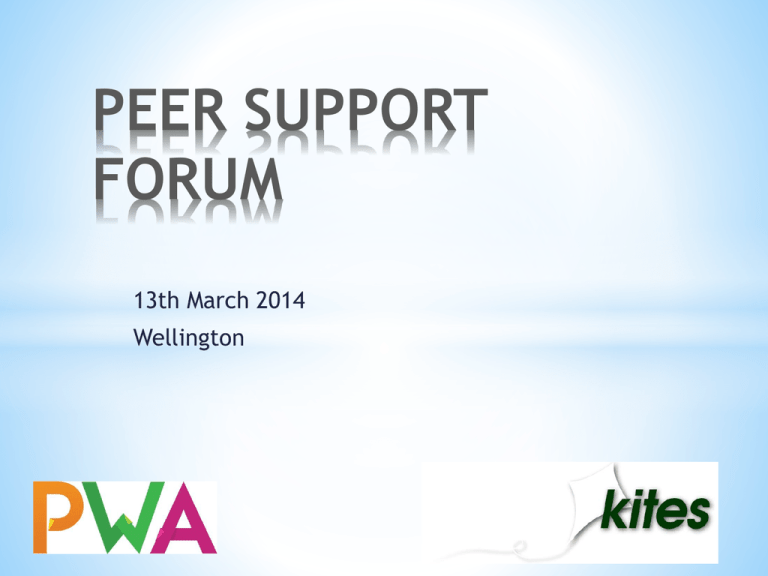
PEER SUPPORT FORUM 13th March 2014 Wellington www.peersupport.net.nz Send links and materials for upload to: Frank@balancewhanganui.org.nz Sharing collective knowledge from today * explore questions that matter to us * Encourage each persons contribution * Whoever is here, we are the right people * Find answers to our burning questions * Remember there is a wealth of knowledge in the room Group Culture The agenda for the day had some structure as well as time for networking and discussions. We encouraged everyone to take responsibility for the success of the day and for their own learning. * 10 am • • • • START Welcome & Introductions What peers have to say about peer support (Findings from the Toka Tū Project) Discussion – How do we ensure Peer Support remains sustainable? What does “good” peer support look like? (A resource developed by Toka Tū) 12 NOON -1PM • • • What’s happening around the country? Who is a peer? - defining Peer Support workers Peer Workforce Association – Code of Ethics for Peer Workers 3 - 3:20 p.m. • • Lunch (make own arrangements) Afternoon Tea Magdel Hammond- recruiting, training and supporting Peer staff Open discussions on topics decided by participants 5PM FINISH Who came Leilani Maraku ( Te Upoko) Hinerangi Bidois (Journeys to Wellbeing) Brian McKillop (Walsh Trust) Lynette Knox (Lynx Consultants) Stella Caruthers John Tovey (C&CDHB) Derek Challenor ( C&CDHB) Matey Gallaway (Aspire Inc) Karen Sale (Aspire Inc) Conray Samual (Aspire Inc) Alexandra Carr (deaf counsellor) Treena Martin (Richmond NZ) Cushla Louis-Carroll (C&CDHB) Richard Anderson (Buddies Peer Support) Anne Helm (C&CDHB) Peter Barnett Dale Mackey (Te Waka Whaiora) Jacinda Waitaiki (Te Waka Whaiora) Gordon Attwood (Mind and Body) Hata Purewa (Richmond NZ) Colin Slade Andrea Bates (Buddies Peer Support) ) Kim Eruera (Buddies Peer Support) Mandy Winther (Buddies Peer Support) Sarah O’Connor (Kites) Tane Rangihuna(Kites) Eileen McAtee(Kites) Apologies Topher Clinch (Phobic trust) Arana Pearson ( Keepwell Ltd) Michelle Dawes (Richmond) Frank Bristol (Balance Whanganui) Andi Hulse(Oasis Network Inc ) Sue Rostrum (Oasis Network Inc) Vicky Hall (Junction) Amanada Reid (PWA/ Te Ara Korowai) Karen Maguire (Mags)( Te Ara Korowai) Egan Bidois Susanne Cummings (PWA/Vaka Tautua) How do we ensure Peer Support remains sustainable? Sustainability of Peer Support 1. Preserving the nature of peer support 2. 3. Human Resource Promotion- How do people find out about it * Peer – People Experiencing Equal Relationships * Clear peer support roles and contracts * How do we articulate what we are doing? * Qualification- Proposed level 4 NZQA peer qualification includes aspects of Intentional Peer Support and NZ legislation and Human rights * Access * * * Advertising Marketing Contractual limitations (e.g. some contracts dont allow for accepting referrals from primary care) * Continue to grow Tu? evidence base –encourage possible projects falling out of Tōka * Note not a definitive list but a rough idea (and apologies if i have misplaced these some of the stickees fell off ~Eileen ) * Lightly working on strengths to build relationships * Time, patience, finding a smile * “Subtle infiltration of the worth of lived experience as a taonga in employment – by employing peers” * Support in crisis/ alternative to the system / provision of meals/food/ employs staff with lived experience/ safe supportive place to be/ non judgmental (aroha) * Support for prisoners – assessment and referral for AoD and mental distress/ family violence/ gambling /supervision and training * Mixture of inpatient and community initiatives run by peer support * * * * * * * * * workers West Auckland – Hearing voices group Peer Zone Waitakere - Drug courts- peer support Peer support in waiting rooms CMCHs and CADS Action research project re supervision for Peer Support staff at Connect SR Kataia looking at AoD /mental health residential to change delivery and include peer support component Puna Whakataa – AoD respite in Manakau Piri Pono- Acute Alternative to admission Peer run and led Auckland DHB – through Walsh Trust –in acute ward non clinical role alongside Occupational Thearapists – peer support coffee group * * * * * * * * * * * * * * * Wellington Hearing Voices Network – groups in in-patient unit fortnightly Balance Wellington Bi-polar support Group. Throughblue Womens Depression Group Oasis one –to –one peer support Matahauariki and Mauri ora tinana Peerzone Key We Way Buddies – peer volunteers to inpatient Amigos coffee group Warmline Supported employment e.g. Worklink Consumer working with community mental health service AA and NA fortnightly meetings open to inpatients at Te Whare o Matairangi Weekly peer run groups at Te Whare o Matairangi – Wrap/ Writers/Tangata whaiora Te Ara Korowai – individual and group peer support * Adult day activities * AoD education early intervention * Whānau support night * Adult telephone peer support * Prison support and whānau support * Living skills * Whānau ora plans Nelson * Looking at acute alternative * Te Kotuku- peer respite Christchurch * Peerzone * MHAPs- individual IPS/ group peer support * Is it a title we give ourselves or is it the other person who says to us “I consider you my peer” ? * Peer – People Experiencing Equal Relationships * Some people have the feeling the more general use of “peer” outside of peer support is diluting the meaning . e.g some one who has given up smoking called a “peer” when offering smoking cessation support to people using secondary mental health services * To promote and support the Peer/ consumer /tāngata whaiora workforce in the greater Wellington Region The decision to establish an Association came from the views and opinions of people with experience of mental distress or addictions that work in the sector. There was no professional body specifically for people with experience of mental distress or addiction. Peer Worker is a term that is still in its infancy, broadly a peer worker is someone who: * Has disclosed first-hand experience of mental distress or addiction * Works in paid or voluntary roles within the mental health and addictions sector * May or may work in a role specifically labelled as a “peer worker” *An incorporated society *Run by a governing committee elected at AGM *member-driven and funded. The ongoing sustainability of the Association will be based on membership fees and voluntary fundraising and events. * Association of peer supervisors (a Changing Minds led * * * * Project) - possible could be a strand for accredited Supervisors within PWA Assisting with articulating “Peer Support” to funders Klout in sector ASENZ (was Association of supported employment ) have a look at the lessons they learned. Talk to Ian Harper re what they learned as a board/focus on training for practitioners and managers PWA = answer W.I.F.M (what’s in it for me) question. Answers might be: * * * * * * * * * * Events Professional body Individual vs organisational membership Sharing of information Peer Support/mutual Support / mentoring of each other A voice Safe place to discuss Collegiality Promotion of professional practice advcocate for the value of peer services – especially if PWA becomes national * Interest from people in Dunedin and Auckland in forming branches- there will need to be discussion at local level * Suggestion repeat the survey monkey survey that Kites did in Wellington * Attempt to articulate some of the value the peer experience brings * Professionalism/ accountability * You asked for it - survey * Link to membership/ registration? PWA is not a registration body. Can cancel membership but otherwise not a monitoring body. Discussion- are we about compliance if there is a breach of the code of ethics by a member? * Suggestion not to use the Tuakana/ Teina because there can be a power or inequality aspect associated with that relationship for some people Any feedback on our draft Code of Ethics: kiaora@pwa.org.nz
